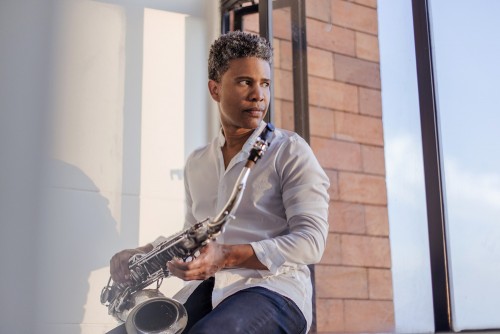Jan 13, 2026 2:09 PM
More Trump-Kennedy Center Cancellations
The fallout from the renaming of the John F. Kennedy Center for the Performing Arts to include President Donald…

David Sánchez investigates folkloric music from Haiti on his new album, Carib.
(Photo: Daniela Murillo)David Sánchez’s music projected an immaculate sense of clarity and purpose when he previewed music from his new album, Carib (Ropeadope), in mid-February at Washington, D.C.’s Kennedy Center. He showcased a new ensemble that featured percussionists Jhan Lee Aponte and Markus Schwartz, and drummer Obed Calvaire. They coalesced various folkloric Haitian and Puerto Rican rhythms with modern jazz momentum, while pianist Luis Perdomo, keyboardist Edward Simon and bassist Ricky Rodriguez augmented Sanchez’s lyrical tenor saxophone improvisations, which unraveled with astonishing fluidity.
The musicians who performed with Sánchez at the Kennedy Center (except Simon) contributed to the recording sessions for Carib, the bandleader’s first bona fide leader date since 2008’s Cultural Survival. But a key link to the new album is Sánchez’s groundbreaking 2000 disc, Melaza, which explored Puerto Rico’s various folkloric African music and culture.
On the new album, Sánchez shifts his focus to Haitian music, particularly rhythms like petwo and kita, then connects the dots in between with rhythms from other Caribbean nations, such as Puerto Rico, the Dominican Republic, Colombia and other places in the United States, such as New Orleans and the Sea Islands off the coast of South Carolina. He sees Carib as a contemporary pan-African project, consisting of original modern jazz compositions.
“But I wanted to start it with Haiti, because it was the second sovereign country in the Americas,” Sánchez explained backstage at the Kennedy Center before his performance. “The African slaves freed themselves in 1803; and in 1804 Haiti became a formal country. Also, Haiti has influenced a lot of places throughout the Caribbean. Haiti was a way for me to get to my own roots, because slaves were being brought [to Puerto Rico] almost as the Haitian Revolution was happening.”
In part, Sánchez’s late wife, Karla, inspired him to investigate Haitian culture. So, in 2016, the saxophonist visited the country’s capital, Port-au-Prince, providing him with an eye-opening experience into how Haitians survive amid devastating poverty.
“I think everyone should take the opportunity to go there to get a greater appreciation of some of the things that we have,” Sánchez said. “A lot of things that we take for granted—like clean water, bathrooms and electricity—people there simply don’t have them. That visit inspired me to do something to help Haiti, even in small steps, like telling others about their difficult stories. I can help create greater awareness.”
While Sánchez sensed the pervasiveness of indigenous music there, he noted that it’s challenging to hear live music in gig-oriented settings. “They don’t play music because they have gigs somewhere; they play music because it’s important to them. They play music at various crucial times in their everyday lives. That alone was inspiring,” he recalled.
While Sánchez was working on Carib, though, tragedy intervened: Both his wife and his father, Dimas, became ill around the same time. His wife passed away in August 2017, and in July 2018, his father died. The impact of losing those two people influenced the recording.
“The project wouldn’t have been the same if we hadn’t gone through that,” Sánchez said. “But even while you’re struggling through some of life’s challenges and changes, music always gives you refuge. I’m still in the process of losing my dad and wife. We carry that grief until our last days. The grief just changes. But I feel like I’m in a really good place. I have people and family who are still here who love me. So, I’m putting more of my energy on that than the loss.”
With newfound determination, Sanchez sees his latest recording as the impetus for additional pan-African musical explorations.
“I’ve been really checking out the culture in South Carolina and the Sea Islands,” he enthused. “I don’t know where I’m going next, but Carib is the start of a whole new journey.” DB

Belá Fleck during an interview with Fredrika Whitfield on CNN.
Jan 13, 2026 2:09 PM
The fallout from the renaming of the John F. Kennedy Center for the Performing Arts to include President Donald…

Peplowski first came to prominence in legacy swing bands, including the final iteration of the Benny Goodman Orchestra, before beginning a solo career in the late 1980s.
Feb 3, 2026 12:10 AM
Ken Peplowski, a clarinetist and tenor saxophonist who straddled the worlds of traditional and modern jazz, died Feb. 2…

The success of Oregon’s first album, 1971’s Music Of Another Present Era, allowed Towner to establish a solo career.
Jan 19, 2026 5:02 PM
Ralph Towner, a guitarist and composer who blended multiple genres, including jazz — and throughout them all remained…

Rico’s Anti-Microbial Instrument Swab
Jan 19, 2026 2:48 PM
With this year’s NAMM Show right around the corner, we can look forward to plenty of new and innovative instruments…

Richie Beirach was particularly renowned for his approach to chromatic harmony, which he used to improvise reharmonizations of originals and standards.
Jan 27, 2026 11:19 AM
Richie Beirach, a pianist and composer who channeled a knowledge of modern classical music into his jazz practice,…